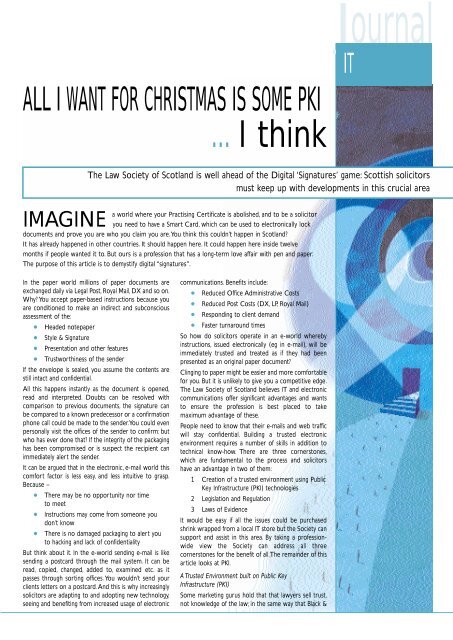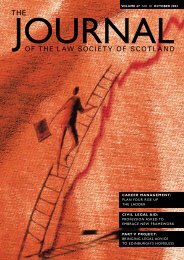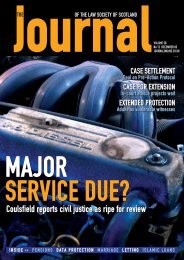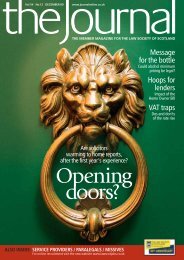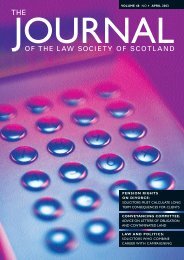OF THE LAW SOCIETY OF SCOTLAND - The Journal Online
OF THE LAW SOCIETY OF SCOTLAND - The Journal Online
OF THE LAW SOCIETY OF SCOTLAND - The Journal Online
You also want an ePaper? Increase the reach of your titles
YUMPU automatically turns print PDFs into web optimized ePapers that Google loves.
ALL I WANT FOR CHRISTMAS IS SOME PKI<br />
... I think<br />
IMAGINE<br />
a world where your Practising Certificate is abolished, and to be a solicitor<br />
you need to have a Smart Card, which can be used to electronically lock<br />
documents and prove you are who you claim you are.You think this couldn’t happen in Scotland?<br />
It has already happened in other countries. It should happen here. It could happen here inside twelve<br />
months if people wanted it to. But ours is a profession that has a long-term love affair with pen and paper.<br />
<strong>The</strong> purpose of this article is to demystify digital “signatures”.<br />
In the paper world millions of paper documents are<br />
exchanged daily via Legal Post, Royal Mail, DX and so on.<br />
Why? You accept paper-based instructions because you<br />
are conditioned to make an indirect and subconscious<br />
assessment of the:<br />
● Headed notepaper<br />
● Style & Signature<br />
● Presentation and other features<br />
● Trustworthiness of the sender<br />
If the envelope is sealed, you assume the contents are<br />
still intact and confidential.<br />
All this happens instantly as the document is opened,<br />
read and interpreted. Doubts can be resolved with<br />
comparison to previous documents, the signature can<br />
be compared to a known predecessor or a confirmation<br />
phone call could be made to the sender.You could even<br />
personally visit the offices of the sender to confirm: but<br />
who has ever done that? If the integrity of the packaging<br />
has been compromised or is suspect the recipient can<br />
immediately alert the sender.<br />
It can be argued that in the electronic, e-mail world this<br />
comfort factor is less easy, and less intuitive to grasp.<br />
Because –<br />
● <strong>The</strong>re may be no opportunity nor time<br />
to meet<br />
● Instructions may come from someone you<br />
don’t know<br />
● <strong>The</strong>re is no damaged packaging to alert you<br />
to hacking and lack of confidentiality<br />
But think about it. In the e-world sending e-mail is like<br />
sending a postcard through the mail system. It can be<br />
read, copied, changed, added to, examined etc. as it<br />
passes through sorting offices. You wouldn’t send your<br />
clients letters on a postcard. And this is why increasingly<br />
solicitors are adapting to and adopting new technology,<br />
seeing and benefiting from increased usage of electronic<br />
communications. Benefits include:<br />
● Reduced Office Administrative Costs<br />
● Reduced Post Costs (DX, LP, Royal Mail)<br />
● Responding to client demand<br />
● Faster turnaround times<br />
So how do solicitors operate in an e-world whereby<br />
instructions, issued electronically (eg in e-mail), will be<br />
immediately trusted and treated as if they had been<br />
presented as an original paper document?<br />
Clinging to paper might be easier and more comfortable<br />
for you. But it is unlikely to give you a competitive edge.<br />
<strong>The</strong> Law Society of Scotland believes IT and electronic<br />
communications offer significant advantages and wants<br />
to ensure the profession is best placed to take<br />
maximum advantage of these.<br />
People need to know that their e-mails and web traffic<br />
will stay confidential. Building a trusted electronic<br />
environment requires a number of skills in addition to<br />
technical know-how. <strong>The</strong>re are three cornerstones,<br />
which are fundamental to the process and solicitors<br />
have an advantage in two of them:<br />
1 Creation of a trusted environment using Public<br />
Key Infrastructure (PKI) technologies<br />
2 Legislation and Regulation<br />
3 Laws of Evidence<br />
It would be easy if all the issues could be purchased<br />
shrink wrapped from a local IT store but the Society can<br />
support and assist in this area. By taking a professionwide<br />
view the Society can address all three<br />
cornerstones for the benefit of all.<strong>The</strong> remainder of this<br />
article looks at PKI.<br />
A Trusted Environment built on Public Key<br />
Infrastructure (PKI)<br />
Some marketing gurus hold that that lawyers sell trust,<br />
not knowledge of the law; in the same way that Black &<br />
<strong>Journal</strong><br />
IT<br />
<strong>The</strong> Law Society of Scotland is well ahead of the Digital ‘Signatures’ game: Scottish solicitors<br />
must keep up with developments in this crucial area


